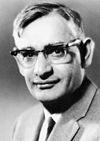List of Pakistani Nobel laureates
Appearance
This is a list of Nobel laureates who are either Pakistani or were born in undivided British India (now Pakistan) but are not Pakistani by nationality.
Laureates
Pakistani citizens
As of 2018[update], the list of list of Pakistani Nobel laureates consists of following people.[1]
| Year | Portrait | Laureate | Subject | Rationale |
|---|---|---|---|---|
| 1979 | 
|
Abdus Salam | Physics | Awarded jointly to Sheldon Lee Glashow, Abdus Salam and Steven Weinberg – "for their contributions to the theory of the unified weak and electromagnetic interaction between elementary particles, including, inter alia, the prediction of the weak neutral current"[2][3] |
| 2014 | 
|
Malala Yousafzai | Peace | Awarded jointly to Kailash Satyarthi and Malala Yousafzai – "for their struggle against the suppression of children and young people and for the right of all children to education."[4] |
Pakistani laureates born in the Pakistani area of then-British India
The laureates below were born in undivided British India (now Pakistan) but are not Pakistani by nationality.
| Year | Laureate | Country | Subject | Rationale | |
|---|---|---|---|---|---|
| 1968 | 
|
Har Gobind Khorana (born in Raipur, British India) |
Physiology or Medicine | Awarded along with Robert W. Holley and Marshall W. Nirenberg – "for their interpretation of the genetic code and its function in protein synthesis."[5] | |
| 1983 | Subrahmanyan Chandrasekhar (born in Lahore, British India) |
Physics | "For his theoretical studies of the physical processes of importance to the structure and evolution of the stars."[6] | ||
References
- ^ "By winning the Nobel prize, Malala joins Pakistan's loneliest club". Washington Post.
- ^ "The Nobel Prize in Physics 1979". Nobel Foundation. Retrieved 2008-10-09.
- ^ Arun Agarwal (2008). Nobel Prize Winners in Physics. APH Publishing. pp. 234–. ISBN 978-81-7648-743-6.
Pakistani physicist Abdus Salam won the 1979 Nobel Prize in physics. He won the award for his work in developing a unification hypothesis concerning electromagnetic and weak interactions between atomic particles.
- ^ "The Nobel Peace Prize 2014". Retrieved 4 May 2015.
- ^ "H. Gobind Khorana". Retrieved 4 May 2015.
- ^ "Subramanyan Chandrasekhar". Retrieved 4 May 2015.

